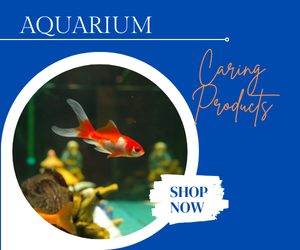The Three Beacon Pleco (scientific name: Leporacanthicus triactis) is one of our favorite freshwater fish that brings a different look to any aquarium. This bottom-dwelling fish will constantly search in the aquarium for any leftover food and keep your tank clean off excessive organic waste. It’s always nice to have a little extra help in maintaining the aquarium clean! L091 Pleco are also very easygoing and friendly fish that can live in most community tanks. Given the right conditions, they will not bother or disturb other fish present in the tank.
Here in this article, you’ll learn the correct Three Beacon Pleco care guidelines and all other information you might need.
Species Profile & Overview
Three Beacon Pleco (L091 Pleco) is a member of the Loricariidae family (plecos) that comes from the Upper Orinoco in Venezuela. Members of this family have an armored back that protects them from predators and have unique markings and colors that are well adapted to the region they live in. Their color and patterns will help them camouflage in the driftwoods and rocks found in the Orinoco river.
In the aquarium hobby, their unique body color and skin markings made them desirable fish for most aquarists. This popularity is more evident in recent years.
These fish are very shy and mostly active during the nighttime. So it’s important to provide them with lots of hiding spots to get a nap during the day.
The majority of Three Beacon Plecos that are sold in pet stores are wild-caught. This is because these fish need specific water conditions to breed. Recreating the ideal breeding environment for this fish is slightly difficult which is why not many breeders want to breed them in captivity.
Appearance:
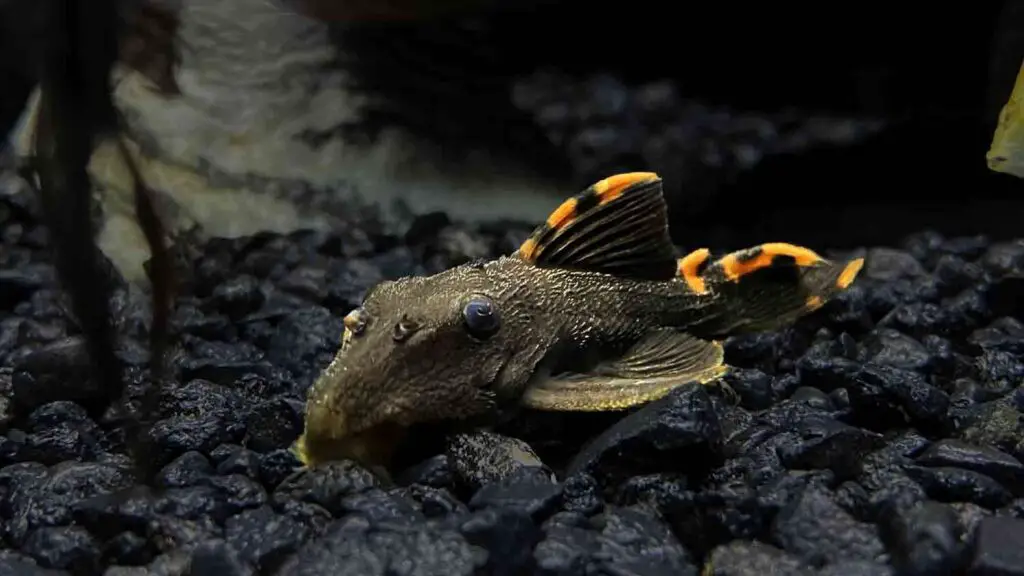
L091 Pleco has a familiar pleco shape with a bony back. But their marking and color set them apart from other related fish.
Their cylinder body is covered with hard bone plates on the back and a very soft skin under the belly. The eyes are located on top of the head so they can monitor their surroundings. Right under the eyes but a little pushed towards the front is their mouth.
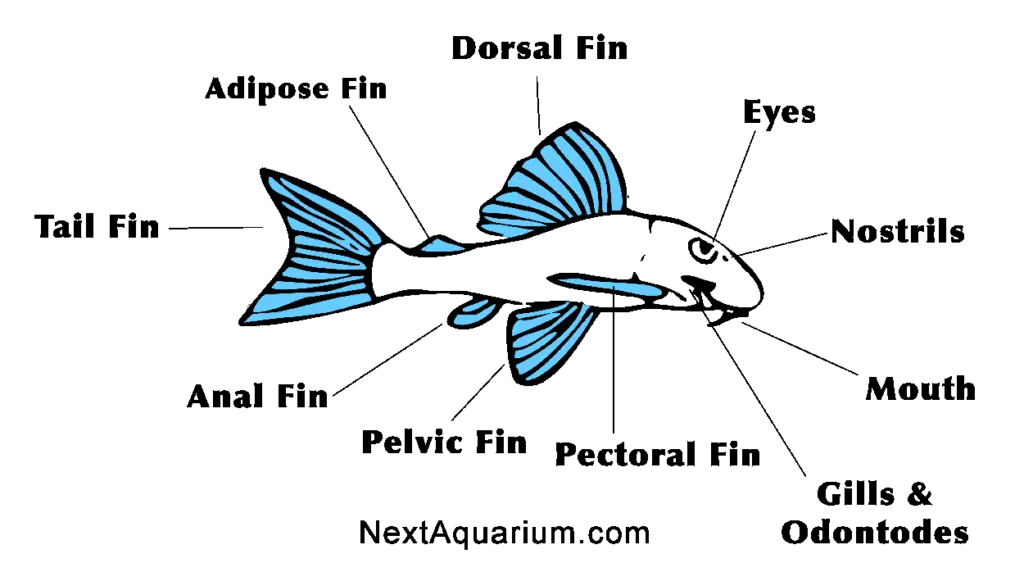
The fins have a triangular shape that shares the same colors and patterns as the rest of the body. They have 8 fins in total that are used to swim and maneuver in the water.
They have unique markings and colors that make them stay apart from other Loricariidae fish. The L091 comes with black or spotted color morphs. Both morphs have the iconic orange stripes on their dorsal, adipose, and tail fins. These markings are what sets them apart from the other plecos in the area. The belly area is usually light color with no visible patterns. When fish are under stress they tend to lose their coloration.
Adult Size
The average Three Beacon Pleco size is 10 inches. Males specimens tend to get slightly bigger and bulkier than females.
In rare cases, they might grow one or two more inches in length. This happens in rare cases and will only happen after years of proper care and diet.
Lifespan
In a well-maintained tank, the L091 Pleco lifespan is between 10 -15 years.
They only reach this age if they receive a good diet and pristine water conditions throughout their lifetime. Without a well-maintained tank, they might become ill that might result in a shortened lifespan.
Behavior and Temperament
Three Beacon Pleco are very friendly pleco under the right conditions. Most of the time they are calm and mind their own. They will hide during the day and will scavenge for food during the night.
That being said, these fish will stand for themselves if anyone decides to bully them. They will also come out of their hiding during the daytime as well. This usually happens when the fish feels safe in the tank.
They might also fight over territory and caves with other bottom-dweller fish in the tank. Males get more aggressive when other fish come close to their caves or favorite hiding spot.
In order to prevent this aggressive behavior, you will need to provide them with a large tank or just move some of the males to another tank. Provide lots of hiding spots in your tank so each pleco can have a space to hide. Adding a cave for each male is another way to house more plecos peacefully in a tank.
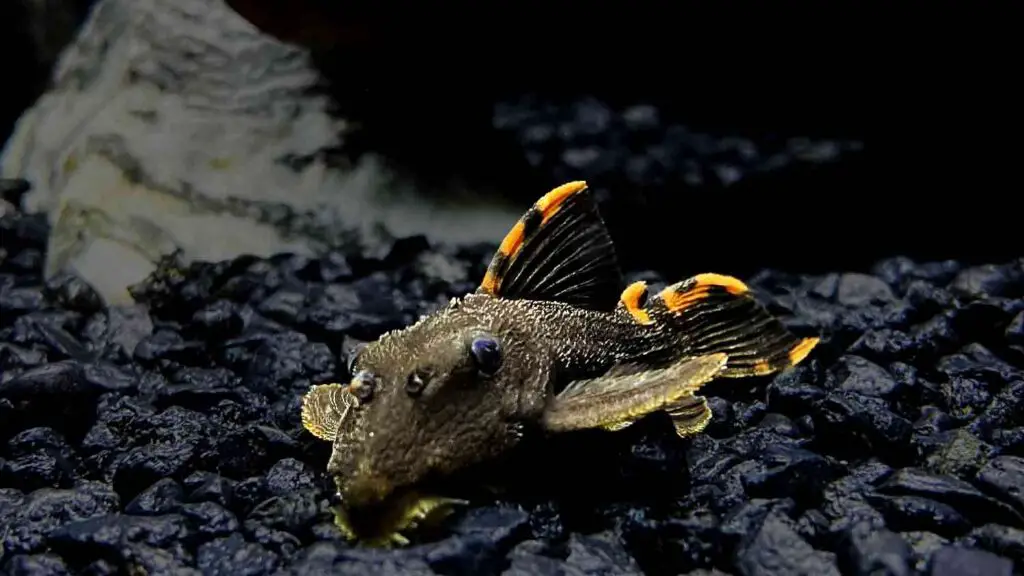
Three Beacon Pleco Care
Three Beacon Pleco Care isn’t a challenge and anyone can do it. These fish adapt well to life in the aquarium. When you provide them with the right environment they will happily live for many years.
They’re a peaceful species that will mind their own business without demanding a lot of attention. When they get clean water and a rich diet, they will live happily in any aquarium.
For an ideal living environment and care, you will need to follow the key points we mentioned below.
Tank Size
The minimum tank size for a single Three Beacon Pleco is 75 gallons or more. These fish are one of the larger types of plecos, which makes it impossible for aquarists to keep them in smaller size aquariums.
That said, When you keep more than one L091 Plecos, you will need to obtain a bigger aquarium. Like All bottom-dwellers fish, these guys need more bottom surface so the tank’s volume is not always the best way to calculate the number of plecos you can house.
Picking a wider tank is recommended for Three Beacon Pleco as they mainly stay at the bottom of the tank and rarely swim in the water column. Wide tanks will provide more floor area and make it easy for you to add more decorations to create even more floor surfaces. Adding tiles, slate stone, rocks, and driftwoods will create more surfaces for the fish to swim and hide.
Tank Setup:
The tank setup is super important for plecos to keep them calm and stress free. These fish are shy and nocturnal and will need specific items in the tank to feel safe. Three Beacon Pleco spends most of its time swimming at the bottom of the tank and around decorations. This means you will need to pay attention to the items you put in your tank.
These fish need lots of hiding spots to feel safe. You can create this by adding lots of rocks and driftwoods to your aquarium. During the day, they will hide in the shadows and crevasses created by the decorations. They feel safest in a pleco cave. These caves are specially made for plecos and will provide a dark space for the fish to rest during the daytime.
Plecos are almost always sitting on their soft belly and when they swim their bellies are very close to the bottom of the tank. Sharp substrates will eventually cause injuries to their abdomen area that might result in different types of infections. Sand is the most suitable substrate for plecos. You can also use planted tank substrate if you are planning to have freshwater plants.
Every healthy ecosystem needs plants to function properly. Aquatic plants will remove pollutants from your tank while also providing plenty of hiding places for your fish. To enhance the appearance and suitability of your aquarium, we highly recommend utilizing plants in your aquarium.
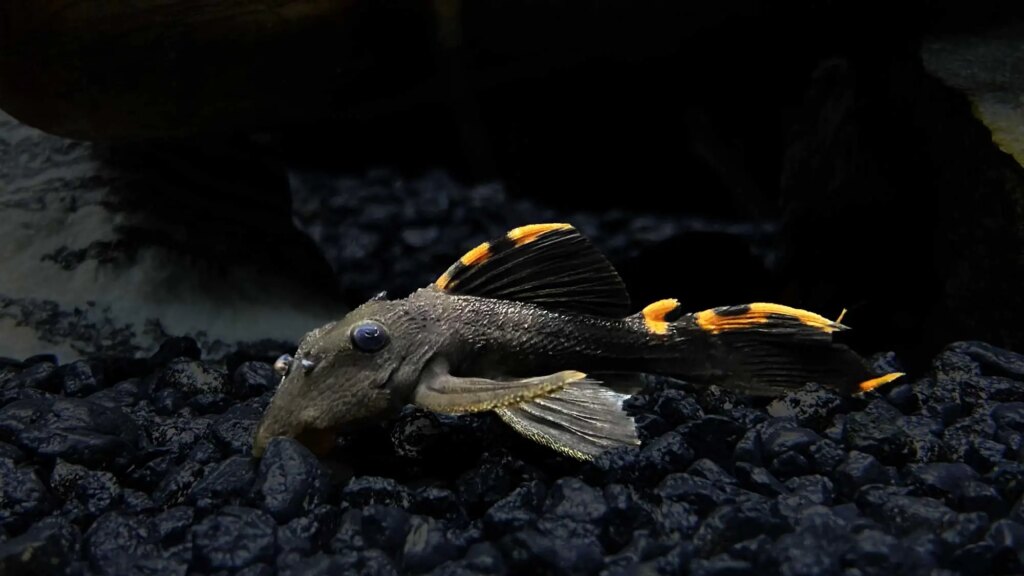
Water Parameters:
Three Beacon Pleco are coming from tropical regions of South America and will need warmer water temperatures. In the wild, they live in warm, dark, and full of driftwood rivers that have plenty of food sources. In an aquarium environment, they need balanced and steady water parameters. Below are the tank parameters you can keep L091 Plecos in:
- Temperature: 75 – 82 Degrees Fahrenheit
- pH: 6 – 7.5
- TDS: 100 – 200 PPM
Regular water changes are very important to the health of this fish. They love clean waters that are well oxygenated. Water current is also another important topic to think about. These fish are coming from slightly fast-moving streams. This means you will need to place a powerhead in the tank to create a steady current in the tank.
Lighting:
You should pick your light based on the types of plants you keep in your tank. Avoid utilizing intense lighting if you don’t have any live plants because Three Beacon Pleco does best in the shade. If you have live plants or just want to use a strong light for aesthetic reasons then simply add more caves and hiding spots so your pleco can feel safe.
Filter System:
Plecos in general, and Three Beacon Pleco in particular, produce a lot of waste. As a result, you will need a powerful filter to ensure that your tank water stays clean at all times. Since L091 Plecos are extremely vulnerable to ammonia spikes, you must use the largest possible filtering systems that you can afford. Large filters can keep up with waste production and prevent ammonia spikes.
Common Diseases and Prevention
While some fish have their own species-specific diseases, there are no known diseases for Three Beacon Pleco species. That being said, these fish are vulnerable to all known aquarium diseases. Your aquarium is a tiny ecosystem and diseases will easily and quickly transfer from fish to fish.
You will need to clean the tank regularly and keep an eye on the water parameters. Never leave any uneaten food in the tank to rot. Never add new fish to your tank without properly quarantining them. Regular water changes and good food will prevent many of the diseases aquarium fish might get. Prevention is the best cure!

Diet and Feeding Requirements
Three Beacon Pleco are carnivores (meat-eaters) fish that will mainly eat high protein foods. However, they will also consume low quantities of algae, plant matter, fresh vegetables, and other plant-based foods. There will be times that you might see your L091 Pleco chowing down on algae grown on glass or decorations. This shouldn’t lead you to believe that you can feed these fish with algae-based foods.
You need to provide them with a complete diet that can nourish your fish with all the nutrition it needs. As mentioned, these fish are carnivores so you should feed them more high protein foods and less plant-based foods. For protein, you can feed your pleco with frozen or live foods like bloodworms, brine shrimp, tubifex, daphnia, and other small creatures. These make a great source of protein that will also provide a lot of other nutrients they need.
There are multiple commercially produced dry foods available for bottom-dweller fish. Some of these foods are very high quality while some might not have all the ingredients your fish needs. Regardless, you will need to purchase a few different types of them to feed an ideal diet for your Three Beacon Pleco. High-protein pellets or fish flakes mixed with a low amount of plant-based foods are an ideal combination to feed.
Sinking foods should be the main food your Three Beacon Pleco gets every day. Live or frozen foods are great snacks that can be given a few times per week. When feeding your fish make sure they receive diverse types of foods so they can get all the elements they need. The ideal time to feed your plecos is at night, that’s because the L091 Pleco are mainly active at night. Never feed more than what they can eat during the night.
Breeding Three Beacon Pleco
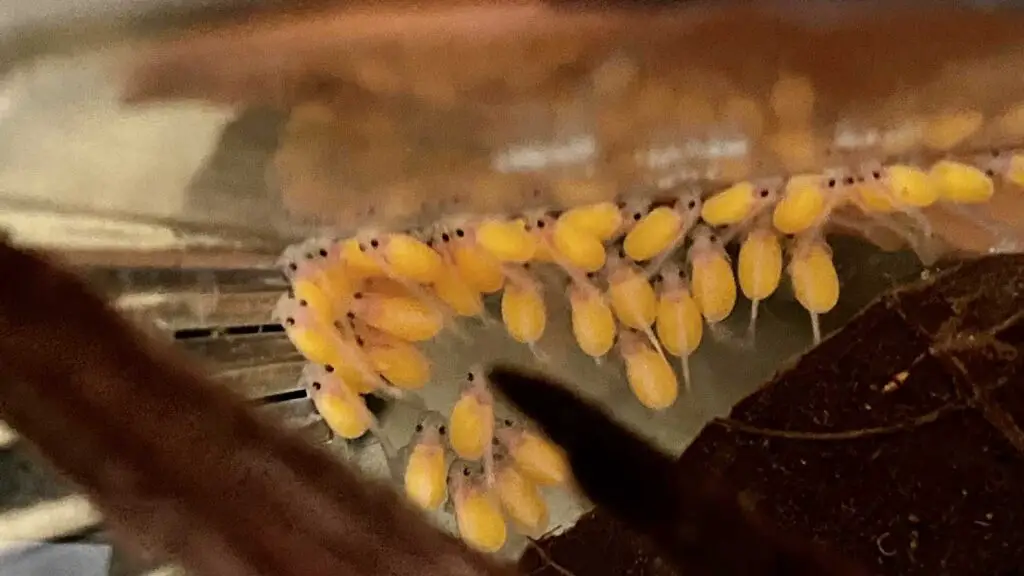
Breeding Three Beacon Pleco is a delicate and sometimes frustrating process but can be done in an aquarium environment when the conditions are right.
In order to breed these fish, you will need your L091 Pleco to be mature and at least 3-5 years old. Once you confirm you have at least one male and one female in your breeding group, you can start to condition your fish for breeding.
They will need a tank that is at least 120 gallons and has a strong water current. The TDS and pH has to go down to trigger the breeding cycle. Feeding your fish with quality high protein foods will encourage them to breed.
If you have more males in your tank, then make sure that each male has a cave available in the tank for them. The rule of thumb is to add at least one cave per each male if not more.
L091 Pleco are cave breeders which means they need caves to breed. The cave should be slightly bigger than the male’s body; but, small enough that he can trap the female inside.
For breeding purposes, the male looks around for a suitable cave to trap the female in. When the male finds a suitable cave, he will clean it out and wait for the female to arrive. The male will then trap the female and will not let her leave the cave until she lays eggs.
Once eggs are laid, the male will let the female leave the cave, and then he will fertilize the eggs. It’s the male job to guard the eggs until they hatch. During this time, the male cleans the eggs and fans them so the eggs don’t go bad or get mold.
They lay 50 – 100 eggs that will usually hatch after 8-10 days of being laid.
After hatching, the fry usually stay at the back of the cave and feed on their egg sacks for the next few days. The male will keep the fry in the cave for another 10-12 days until they are fully developed and ready to leave.
Once the fry are strong enough, they will escape the cave and will attach to driftwood or glass in the aquarium. The fry usually stays together in a cluster in a single spot until they grow to half an inch in length.
Tank Mates
Three Beacon Pleco are mostly passive and peaceful fish, however, male specimens might fight over territory when they are in their breeding season. That being said, when you set up the tank properly, this fish will not show any aggressive behaviors. When selecting the tank mates always check if all the fish you want to keep can live in the same tank parameters or not.
Three Beacon Pleco can live with most South American aquarium fish. That said, it is wise to choose similarly sized fish that are not very aggressive. This species is a bottom dweller, so it will not go after any fish that is swimming in the water column. The key to selecting the right tank mates for L091 Pleco is to select fish based on their aggressiveness and water parameter requirements. Here are some good tank mates you can keep with your pleco:
- Common Pleco
- Sailfin Pleco
- German Blue Ram
- Apistogramma
- Angelfish
- Dwarf Gourami
- Discus
- Tetras
- Other Plecos

Conclusion
If you can create a healthy environment for Three Beacon Pleco (L091 Pleco) then you should definitely add one to your tank. Always make sure you have enough space in the tank for the amount of fish you keep. Only add fishes that require the same conditions and diet pet pleco. Doing this will provide a healthy habitat for your pleco and their tank mates. Congratulations! Now you know everything about L091 Pleco care and you can confidently own one.



